Working Together to Protect a National Treasure: Stewardship in Florida Keys National Marine Sanctuary
We are drawn to the ocean. From the moment we smell the salty air, dip our toes in the water, and peek below the surface, we are captured by the beauty of the Florida Keys. Over the last 30 years, Florida Keys National Marine Sanctuary has led education programs that teach visitors and locals about the delicate marine environment in the Florida Keys and spearheaded stewardship projects that help to protect this special place.
Coral Reef Classroom

Coral Reef Classroom, Florida Keys National Marine Sanctuary's longest-running education program, engaged over 5,000 local middle school students in hands-on learning experiences that taught them about ocean science from 1994-2010. Through classroom and on-the-water activities, students learned about the diverse and fragile nature of the coral reef ecosystem, including basic coral reef biology and concepts of habitat interconnectivity. Field activities such as snorkeling, a plankton tow, and the collection and analysis of water quality data encouraged analytical thinking, and taught students about the role that resource management plays in protecting natural resources.
Eco Discovery Center
Enter the Florida Keys Eco-Discovery Center and take a journey into the world of the native plants and animals of the Keys, both on land and underwater. Leave with an increased awareness and appreciation of the need to protect and conserve the ecosystems of South Florida.
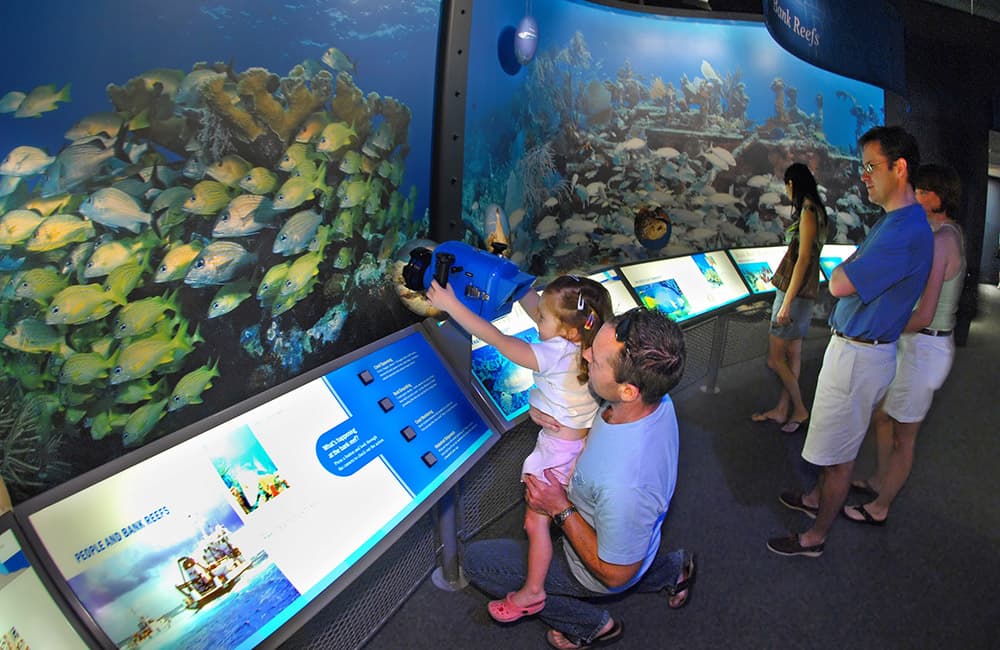
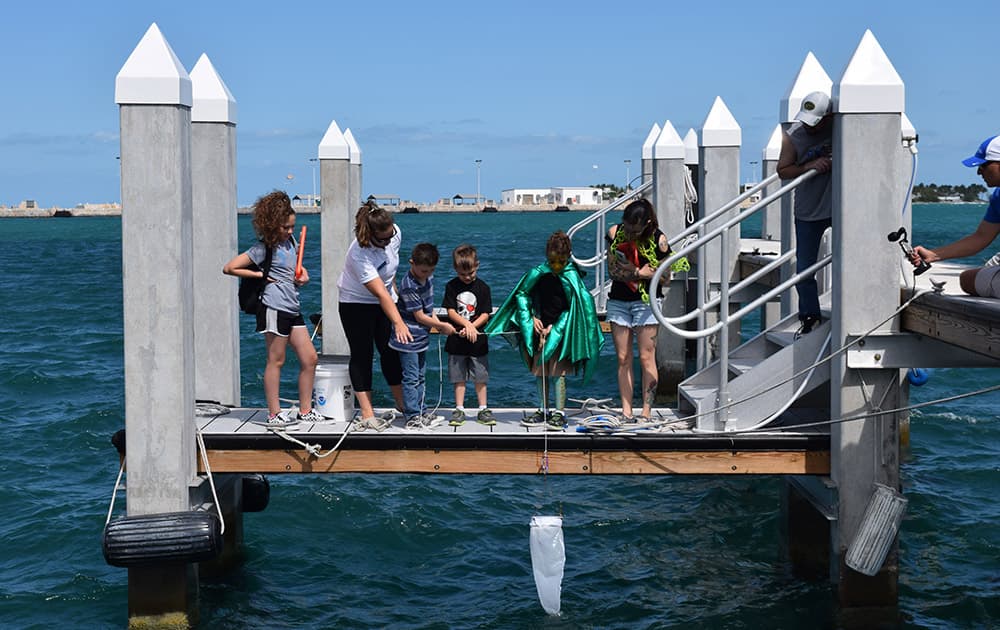
Since opening in 2007, the Florida Keys Eco-Discovery Center has welcomed 750,000 residents, families, school groups, and visitors from over 85 countries. The center has housed world-renowned artists displaying their unique projects, served as a stage for leading scientists to share their work, and been a place of refuge for rescued corals. Perhaps most impressive, the Eco-Discovery Center has provided more than 18,500 students with an engaging and interactive platform to learn more about the natural and cultural wonders that make the Florida Keys unique.
The Florida Keys Eco-Discovery Center, has also been recognized as a Leadership in Energy and Environmental Design (LEED) certified green building and awarded a LEED Silver rating by the U.S. Green Building Council.
Boater Education
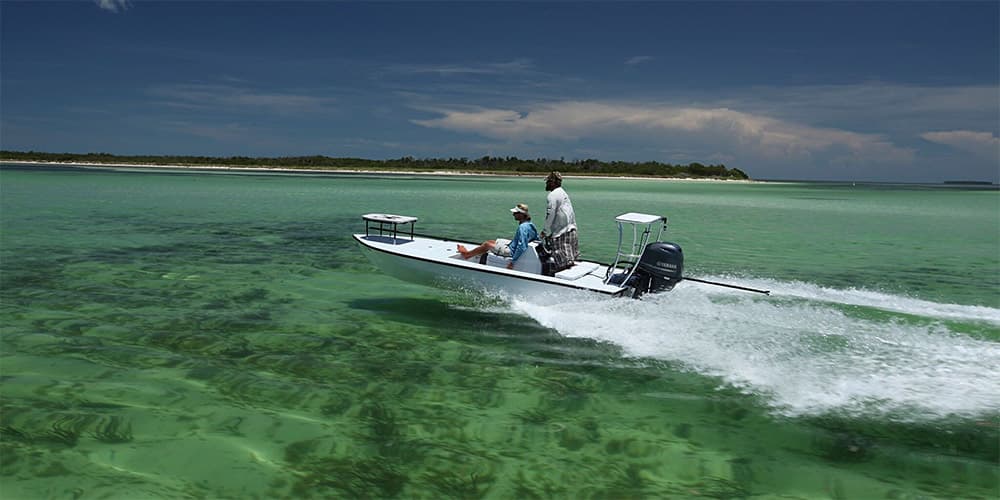
When you leave the dock in the Florida Keys, often the water gets shallower before it gets deeper. Sandbars, coral reefs, and shallow seagrass beds pose obstacles. Fishers, scuba divers, wildlife, and waterfront residents prefer not to be disturbed by inconsiderate boaters. An improperly placed anchor can do decades of damage. One mistake can be costly. Add to the mix the complex marine zones and regulations of Florida Keys National Marine Sanctuary, and education becomes a must for any boater.
Blue Star Programs
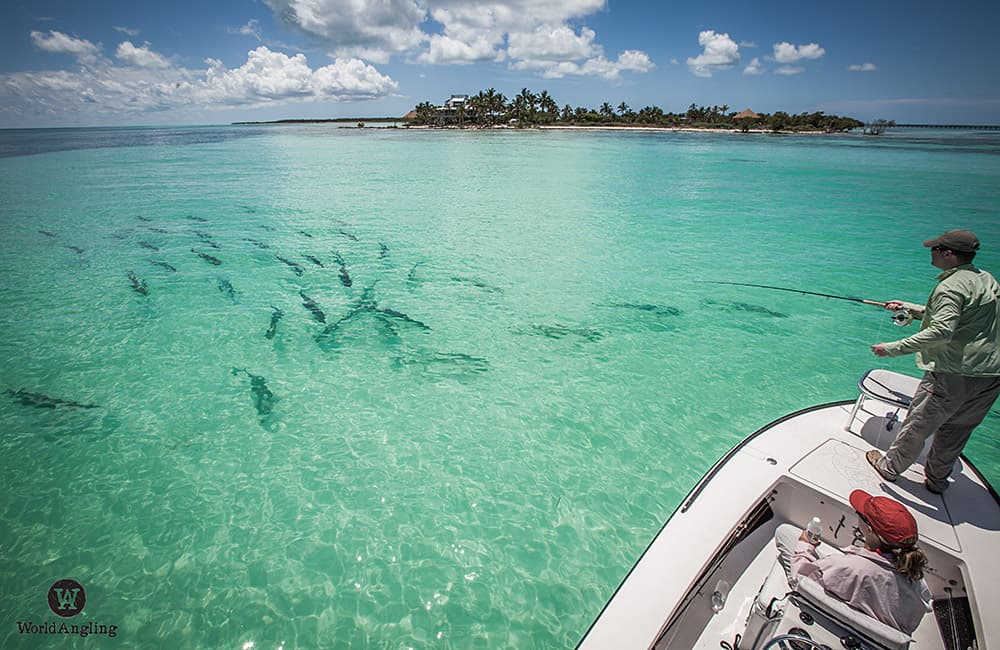
The beautiful, clear waters of Florida Keys National Marine Sanctuary attract over 5 million visitors annually. The multitude of habitats with close proximity to land and an abundance of boat operators in the Keys make this diverse underwater world easily accessible for the novice snorkeler and the seasoned scuba diver alike, and provide endless opportunities to enjoy the fisheries resources of the sanctuary. While divers, snorkelers and fishers come to enjoy the beautiful marine environment, sometimes they can unintentionally harm this delicate ecosystem.
Blue Star is a voluntary recognition program established in 2009 by Florida Keys National Marine Sanctuary to reduce the impact of divers and snorkelers on the ecosystems of the Florida Keys. In 2018, the sanctuary expanded this program to recognize fishing guides as stewards of responsible angling. Blue Star operators are committed to responsible tourism and go the extra step to educate their customers about this unique subregion of the South Florida ecosystem, protections afforded by Florida Keys National Marine Sanctuary, and responsible diving and fishing etiquette. The Blue Star program salutes charter boat operators who promote responsible and sustainable diving and fishing practices, helping keep the ecosystems healthy for generations to come.
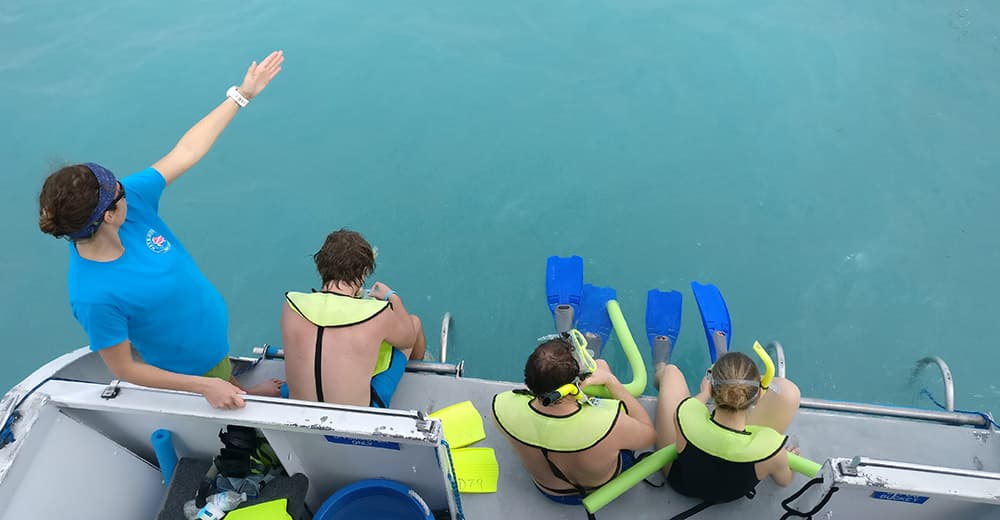
Research has shown that guests who listen to a Blue Star dive briefing were significantly less likely to damage coral during their dive (Krieger & Chadwick, 2012). Blue Star Fishing Guides commit to following science-backed best practices established by national fishing industry groups to promote healthy, sustainable fisheries. If you are visiting the Florida Keys, look before you book and find a recognized Blue Star operator.
Volunteers
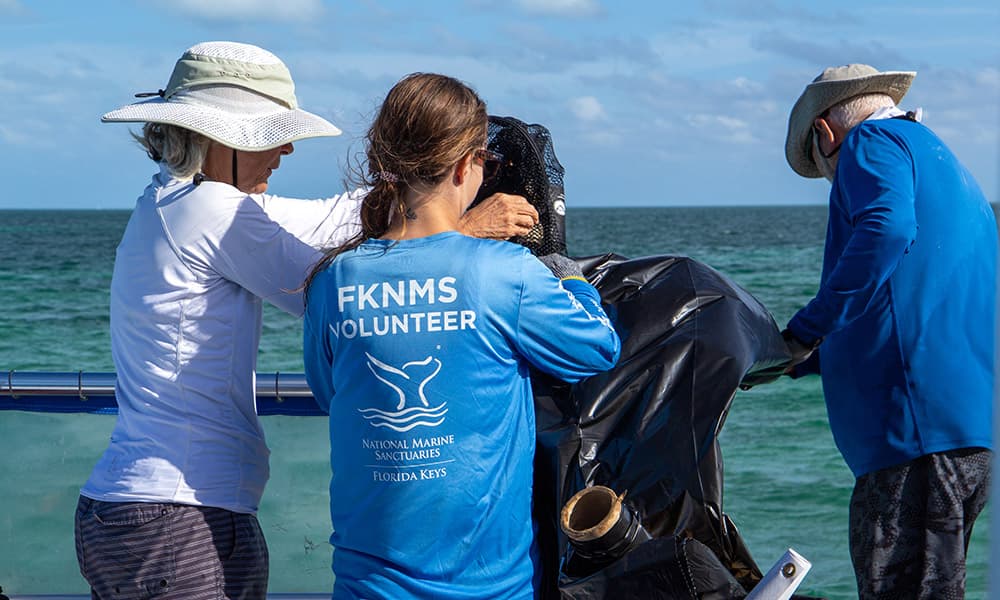
For much of the last three decades, Florida Keys National Marine Sanctuary has worked with volunteers to ensure this unique ecosystem is protected now and for future generations.
Florida Keys volunteers have participated in a wide variety of activities including diving, beach cleanups, water quality monitoring, leading field trips, collecting field observations, and acting as visitor center docents. Sanctuary volunteers have removed and properly disposed of tens of thousands of pounds of marine debris from shorelines in the Florida Keys.
Florida Keys National Marine Sanctuary Team Ocean Conservation Education Action Network (OCEAN) volunteers are stationed on sanctuary vessels at heavily visited reef sites throughout the Florida Keys during peak recreational boating seasons and heavy-traffic holiday weekends. Volunteers inform the public about the sanctuary and its special zones, encourage proper use of sanctuary resources, and provide tips on how to practice basic safety. Since 2005, these Team OCEAN volunteers have directly prevented boat groundings, watching for errant boaters and waving them off when they attempt to cross the shallow reef crest. Informational materials are offered to vessels, and include the charts, sanctuary information, and other helpful tips for navigating Florida Keys National Marine Sanctuary.

The sanctuary also had an all-volunteer Submerged Resource Inventory Team, who spent nearly 9,000 hours documenting historic resources in the sanctuary between 1990 - 2005. The team amassed more than 3,000 images of underwater sites that have contributed to the sanctuary's historical resource inventory, which has catalogued almost 800 sites and artifacts.
Volunteers have contributed a total of 35,000 hours of service in the last 15 years. In appreciation of this time, Florida Keys volunteers have twice been recognized on the national scale from the National Marine Sanctuary Foundation: John Bollinger in 2010, and Will Benson in 2018. These national recognitions shine a spotlight on the incredible work accomplished by the dedicated volunteers of Florida Keys National Marine Sanctuary.
We all have a responsibility to the next generation to protect the resources of the Florida Keys. Join us in our efforts to ensure a thriving ecosystem and economy by visiting this link to sign up to learn more about becoming a volunteer for Florida Keys National Marine Sanctuary.
Sources:
Krieger, J. R., & Chadwick, N. E. (2013). Recreational diving impacts and the use of pre-dive briefings as a management strategy on Florida coral reefs. Journal of Coastal Conservation, 17(1), 179-189. https://doi.org/10.1007/s11852-012-0229-9

